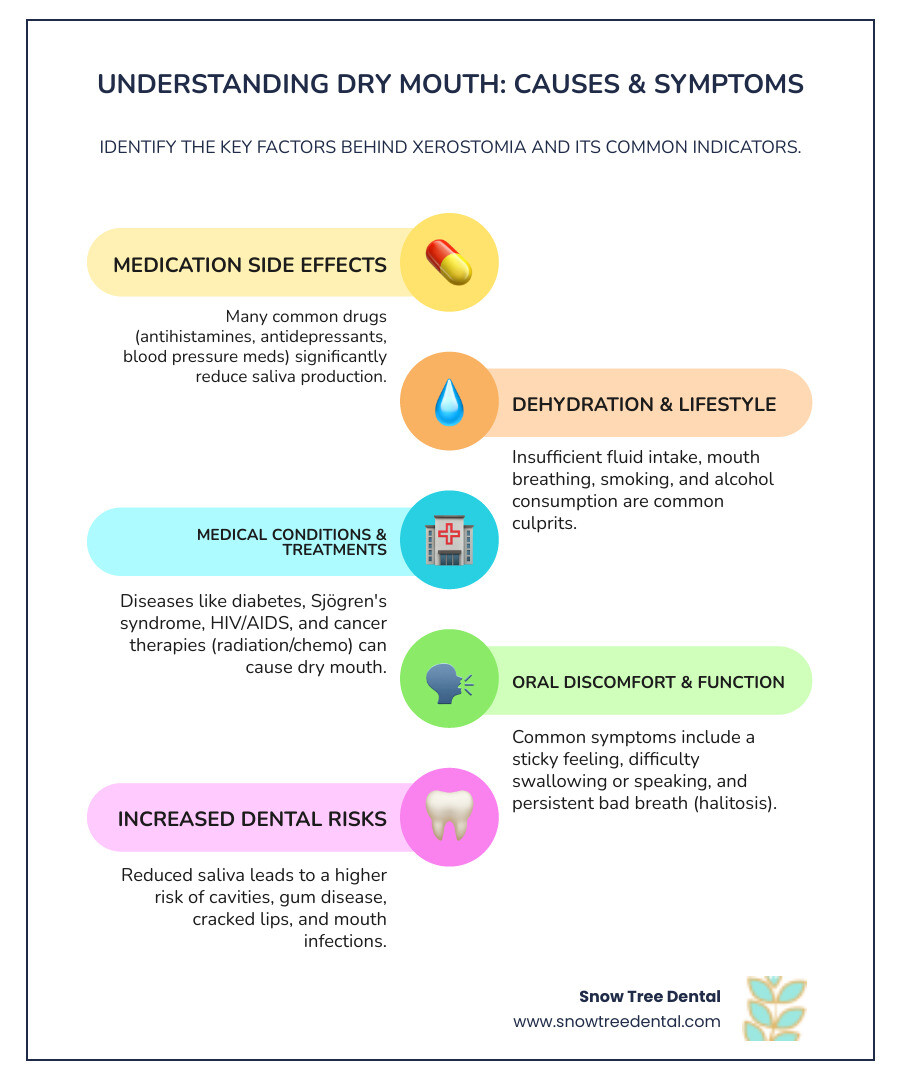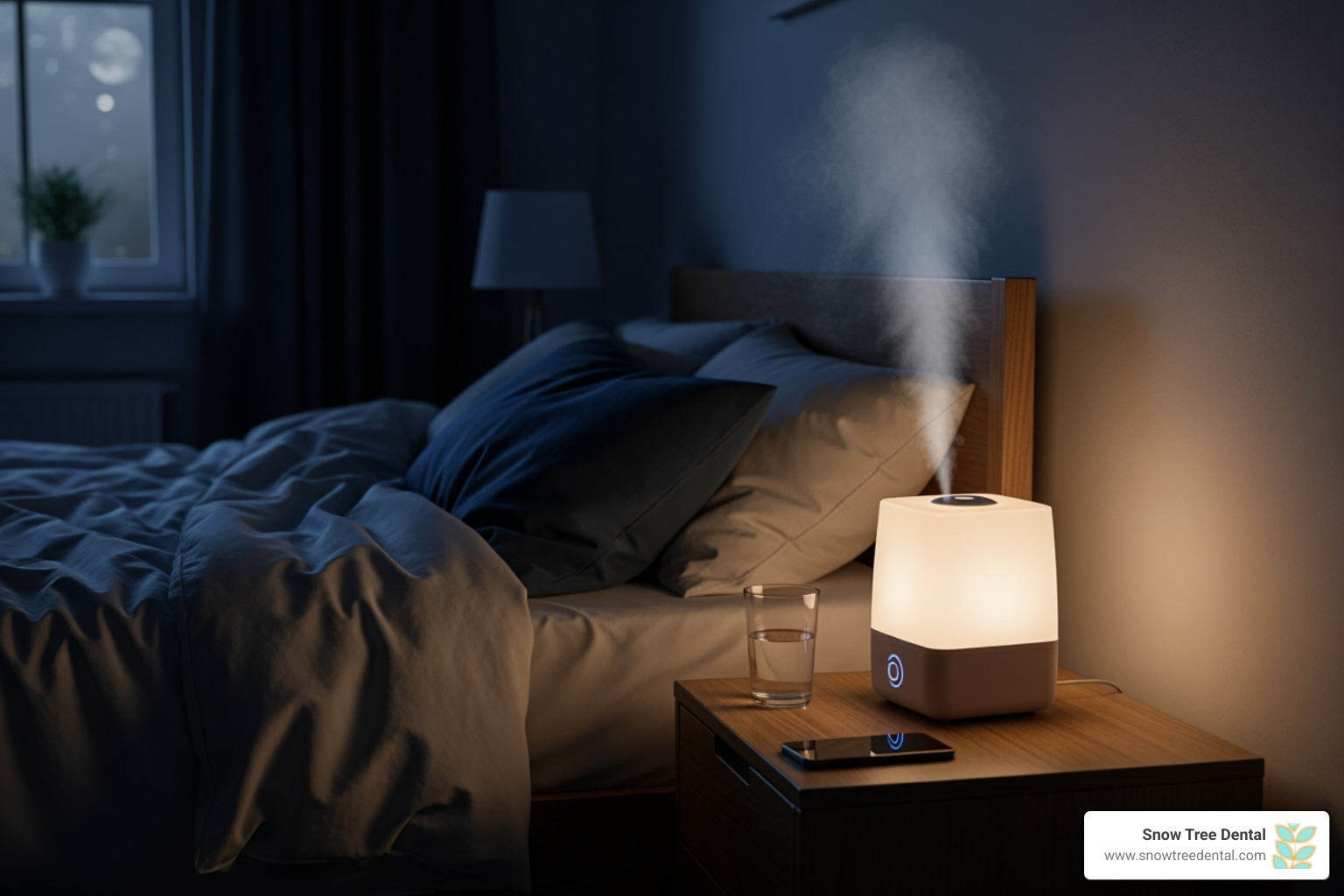Dry Mouth Solutions: Ultimate Relief 2025
Understanding Dry Mouth and Why You Need Solutions
Dry mouth solutions are essential for the millions of people who experience xerostomia – the medical term for not having enough saliva to keep your mouth moist. If you’re dealing with that sticky, uncomfortable feeling in your mouth, you’re not alone. Research shows that dry mouth affects about 1 in 5 people, with 86% of sufferers experiencing symptoms every day.
Quick Relief Options:
- Immediate: Sip water, chew sugar-free gum with xylitol, use moisturizing mouth spray
- Daily habits: Use a humidifier, avoid caffeine/alcohol, switch to alcohol-free mouthwash
- Natural stimulants: Sugar-free lozenges, frozen fruit slices, papaya tablets
- Professional help: Prescription medications, saliva substitutes, acupuncture therapy
Saliva does much more than keep your mouth wet. It contains important minerals like calcium and phosphate that help protect your teeth from decay. When you don’t have enough saliva, you might notice trouble swallowing, speaking difficulties, bad breath, or even cracked lips. More concerning is the increased risk of cavities and gum disease that comes with chronic dry mouth.
The causes range from simple dehydration to medication side effects (the #1 cause), medical conditions like diabetes or Sjögren’s syndrome, and cancer treatments. The good news? There are many effective solutions available, from simple lifestyle changes to professional treatments.
As Dr. Muna Mohammad at Snow Tree Dental in Houston, I’ve helped countless patients find relief through personalized treatment plans that address their specific causes of dry mouth. My experience has shown me that the right combination of dry mouth solutions can dramatically improve both comfort and long-term oral health.
Understanding the Causes of Dry Mouth
Before we explore dry mouth solutions, let’s figure out what’s behind that uncomfortable, sticky feeling in your mouth. Think of it like being a detective – once you know the culprit, you can tackle the problem more effectively.
Dehydration is often the simplest explanation. Your body is basically a walking water balloon, and when you’re running low on fluids, your salivary glands are among the first to feel the pinch. It’s your body’s way of conserving water for more critical functions.
But here’s what might surprise you: medications are actually the number one cause of dry mouth. We’re talking about hundreds of common drugs that can turn your mouth into the Sahara Desert. The usual suspects include antihistamines (those allergy pills that help you breathe but leave your mouth parched), decongestants that clear your stuffy nose, many blood pressure medications, and antidepressants.
If you’re taking any of these and experiencing dry mouth, don’t just suffer in silence. A quick chat with your doctor might lead to a dosage adjustment or an alternative medication that’s kinder to your salivary glands.
Medical conditions can also be the hidden troublemakers. Sjögren’s syndrome is particularly notorious – this autoimmune condition specifically targets your moisture-producing glands like it has a personal vendetta against them. The Sjögren’s Foundation offers excellent resources if you suspect this might be your issue.
Diabetes and HIV/AIDS are also known to cause xerostomia, often as part of their broader impact on your body’s systems.
Cancer treatment presents its own unique challenges. More than 80% of people receiving radiation therapy to the head and neck area experience dry mouth because the radiation can directly damage salivary glands. Chemotherapy drugs can make your saliva thick and sparse, while nerve damage from head or neck injuries can disrupt the signals that tell your glands to get to work.
Don’t overlook lifestyle factors either. Mouth breathing – especially during sleep – creates a constant breeze that dries out your oral tissues. And smoking? It’s like adding insult to injury for your already struggling salivary glands. If you’re ready to quit, the CDC’s Quit Smoking resources can provide the support you need.
Understanding what’s causing your dry mouth is like having a roadmap to relief. Once you know the “why,” finding the right dry mouth solutions becomes much more straightforward.
Effective At-Home and Lifestyle Dry Mouth Solutions
Now that you understand what might be causing your dry mouth, let’s explore the many dry mouth solutions you can try right from the comfort of your home. The wonderful thing about these approaches is that they’re simple, accessible, and often provide relief faster than you might expect.
Hydration is absolutely key – but it’s not just about drinking more water. The secret is in how you hydrate. Instead of waiting until you feel thirsty, try sipping water throughout the day in small amounts. Think of it like watering a plant – little and often works better than flooding it all at once.
Here’s a trick many of my patients love: keep a water spray bottle handy for those moments when your mouth feels particularly dry. A quick spritz provides instant relief. Want to make it even more effective? Try adding glycerin or aloe to your spray bottle. Just a few drops of food-grade glycerin can help the moisture stick around longer since it naturally attracts and holds water.
One of the most underrated dry mouth solutions is using a humidifier, especially in your bedroom. Your body naturally produces less saliva while you sleep, which is why many people wake up with that awful dry, sticky feeling. A humidifier adds moisture to the air around you, making a huge difference in how you feel come morning.
Let’s talk about something that might surprise you – nasal passage care. If you’re breathing through your mouth (especially at night), you’re essentially creating a wind tunnel that dries everything out. Using saline nasal sprays can help keep your nasal passages clear, making it easier to breathe through your nose instead. This simple switch can be one of the most effective changes you make.
Oral hygiene becomes even more important when you’re dealing with dry mouth. Since saliva normally helps wash away bacteria and food particles, you need to be extra vigilant. Always choose alcohol-free mouthwash – alcohol will only make the dryness worse. Stick with fluoride toothpaste and maintain that routine of regular brushing and flossing. These habits are the foundation of good oral health, and you can learn more about why they matter so much on our Preventative Dentistry page.
Stimulating Saliva Production Naturally
If your salivary glands just need a little encouragement, there are some delightfully simple ways to get them working again. The key is giving them something to respond to.
Sugar-free gum is probably the most popular choice, and for good reason. The chewing motion naturally stimulates saliva flow. Look for gums containing xylitol – this natural sweetener not only helps produce saliva but also fights cavity-causing bacteria. It’s like getting two benefits in one small package.
Sugar-free lozenges or candies work on the same principle. Citrus, cinnamon, or mint flavors tend to be particularly effective at getting those glands working. Just be careful with very acidic flavors if your mouth is already irritated.
Here’s something refreshing you might not have tried: frozen fruit slices. Thin pieces of melon or cucumber kept in your freezer can be tucked between your cheek and gum. As they slowly melt, they provide both moisture and a soothing, cool sensation that many people find incredibly comforting.
One of the more interesting natural options we’ve seen success with is papaya tablets. The papain enzyme found in papaya may help stimulate saliva production naturally. It’s worth trying if you’re looking for something a bit different from the usual gum and lozenges.
These home-based approaches to managing dry mouth can make a remarkable difference in your daily comfort. The best part? You can start trying them today, and many people notice improvement within just a few days of making these simple changes.
Dietary and Product-Based Approaches
Making smart choices about what you eat and drink can be just as powerful as any other dry mouth solutions you might try. Think of your diet as another tool in your toolkit – one that you use three times a day!
Let’s start with what to avoid. Caffeine might be your morning best friend, but it’s not doing your dry mouth any favors. Coffee, tea, and sodas act like diuretics, pulling moisture from your body when you need it most. Alcohol works the same way – and that includes those minty mouthwashes with alcohol that can actually make things worse.
Acidic foods like citrus fruits and tomatoes can sting already sensitive tissues. Spicy foods might add excitement to your meal, but they can irritate your mouth when you’re already struggling with dryness. And salty snacks? They’re basically moisture magnets, drawing what little saliva you have away from where you need it.
Now for the good news – there are plenty of delicious ways to add moisture to your meals! Soups are fantastic starters that help prepare your mouth for the rest of your meal. Don’t be shy about adding extra gravies and sauces to your food. That extra gravy on your mashed potatoes isn’t just tasty – it’s therapeutic.
Sipping water while eating makes everything easier to chew and swallow. It’s like giving your food a helpful escort down the hatch. Some of our patients keep a water glass at every meal, taking small sips between bites.
Over-the-counter products for dry mouth solutions
When home remedies need backup, the pharmacy aisle has some excellent dry mouth solutions waiting for you. These products are specifically designed to give your mouth the moisture it’s craving.
Saliva substitutes work like stand-ins for the real thing. Available as drops, sprays, or gels, they coat your mouth with synthetic saliva that feels surprisingly natural. Many patients find oral sprays and gels especially convenient – just a quick spritz or dab whenever you need relief.
The key is knowing what to look for on those ingredient labels. Xylitol is a superstar ingredient that not only helps with moisture but actually fights cavities too. Glycerin acts like a moisture magnet, holding water where you need it most. Aloe vera brings its famous soothing properties to your mouth, while carboxymethylcellulose provides that slippery, saliva-like feeling that makes talking and swallowing easier.
These products have moisturizing properties that can provide relief for hours, not just minutes. The best part? They’re all available over-the-counter, so you don’t need a prescription to start feeling better. Just remember that consistency is key – using these products regularly works better than waiting until your mouth feels like the desert.
When to Seek Professional Help for Dry Mouth
Sometimes the best dry mouth solutions come from working with a healthcare professional. While home remedies and over-the-counter products can provide significant relief, certain situations call for expert guidance and medical intervention.
Persistent symptoms that don’t improve after several weeks of consistent self-care are a clear signal to reach out for help. If you’re still experiencing that uncomfortable sticky feeling despite trying various remedies, it’s time to dig deeper into what might be causing the problem.
When dry mouth starts interfering with your daily life – making it difficult to eat or speak comfortably – professional help becomes essential. We’ve seen patients who avoid social situations or struggle to enjoy meals because of severe dry mouth. This level of impact on your quality of life isn’t something you should have to endure.
Worsening tooth decay is another red flag. Without enough saliva to neutralize acids and wash away food particles, your teeth become vulnerable. If you’re suddenly getting more cavities than usual, your dry mouth might be the culprit. This is where the protective role of saliva becomes crystal clear – when it’s missing, your oral health can deteriorate quickly.
Mouth sores or infections are particularly concerning. Dry mouth creates an environment where harmful bacteria can thrive, leading to painful sores, persistent cracked lips, or recurring infections like oral thrush. These complications need professional treatment to prevent them from becoming more serious.
Consulting a professional opens doors to solutions you can’t access on your own. Your doctor or dentist can review your medications and medical history to identify potential causes. Sometimes a simple medication adjustment or switch can make all the difference. They can also screen for underlying conditions like Sjögren’s syndrome, diabetes, or other health issues that might be contributing to your dry mouth.
At Snow Tree Dental, we understand how frustrating chronic dry mouth can be. Our team takes the time to understand your specific situation and develop a personalized approach to managing your symptoms. You can learn more about our comprehensive approach on our General Dentistry page.
Advanced and medical dry mouth solutions
When home remedies aren’t enough, medical dry mouth solutions can provide the relief you’ve been seeking. These advanced treatments target the root causes and offer more powerful symptom management.
Prescription medications like Pilocarpine can be game-changers for many patients. This medication works by stimulating saliva production directly at the source – your salivary glands. While it’s not right for everyone, patients who respond well often see significant improvement in their comfort and oral health.
An increasingly popular alternative therapy is acupuncture. You might be surprised to learn that this ancient practice has solid scientific backing for treating dry mouth. Scientific research on acupuncture for saliva production shows that it likely works by activating the part of the brain responsible for saliva production.
The results can be particularly impressive for patients who developed dry mouth after cancer treatment. Another study on acupuncture for post-radiation xerostomia found that people with radiation-induced dry mouth experienced lasting relief from acupuncture sessions. Interestingly, those with the most severe symptoms often showed the greatest improvement.
Professional dental care becomes even more critical when you’re dealing with chronic dry mouth. Regular checkups allow us to monitor your oral health closely and catch problems early. We can provide specialized fluoride treatments, recommend prescription-strength oral care products, and create a prevention plan custom to your increased risk for cavities and gum disease.
The key is finding the right combination of treatments that work for your specific situation. With professional guidance, you can move beyond managing symptoms to actually addressing the underlying causes of your dry mouth.
Frequently Asked Questions about Dry Mouth
As a dentist in Houston, I hear these questions about dry mouth almost daily. Let me share the answers that help my patients understand what’s happening and how to find relief.
What is the main cause of a dry mouth?
Here’s something that surprises many of my patients: medications are the most common culprit behind dry mouth. We’re talking about hundreds of different drugs that can reduce your saliva production. The usual suspects include antihistamines for allergies, decongestants for stuffy noses, blood pressure medications, and antidepressants.
But medications aren’t the only cause. Dehydration plays a big role too – your body simply can’t make enough saliva without adequate fluids. Medical conditions like Sjögren’s syndrome specifically attack your moisture-producing glands, while diabetes and HIV/AIDS can also dry out your mouth. Cancer treatments, particularly radiation to the head and neck area, often damage salivary glands. Even lifestyle habits like smoking or breathing through your mouth (especially at night) can leave you feeling parched.
The key is figuring out which cause applies to you, because that determines the best dry mouth solutions for your situation.
Why is my mouth so dry even when I drink a lot of water?
This is one of the most frustrating situations my patients face. You’re doing everything “right” by staying hydrated, yet your mouth still feels like cotton. Here’s what’s likely happening: your salivary glands aren’t producing enough saliva, a condition we call xerostomia.
Think of it this way – if your salivary glands are damaged or suppressed by medication, drinking more water is like trying to fill a bucket with holes in it. The problem isn’t your hydration level; it’s that your glands can’t function properly. This often happens with certain medications, autoimmune conditions, or after radiation treatment.
When water alone doesn’t help, it’s definitely time to see a professional. We need to identify what’s affecting your salivary glands and explore targeted dry mouth solutions that address the root cause, not just the symptoms.
What can I do for immediate relief from dry mouth?
When your mouth feels uncomfortably dry right now, you need fast relief. Here are my go-to recommendations for immediate comfort.
Sip cool water frequently – small, regular sips work better than chugging a whole glass. Keep a water bottle within arm’s reach and take a sip every few minutes. Chew sugar-free gum, especially brands containing xylitol, which can jumpstart your saliva production almost instantly. The chewing motion sends signals to your salivary glands to get working.
Sugar-free lozenges or hard candies work similarly – they keep your mouth busy and encourage saliva flow. For a refreshing twist, try sucking on ice chips or frozen fruit slices like melon or cucumber. They provide immediate moisture while slowly melting in your mouth.
Over-the-counter moisturizing mouth sprays are perfect for your purse or pocket. They give you an instant burst of moisture when you need it most. These quick dry mouth solutions can tide you over until you address whatever’s causing the problem in the first place.
While these methods provide immediate relief, persistent dry mouth usually needs professional attention to find the underlying cause and develop a long-term treatment plan.
Your Partner in Oral Health
When dry mouth goes untreated, it’s like leaving your front door wide open for trouble. Without enough saliva to wash away harmful bacteria and neutralize acids, your mouth becomes a breeding ground for problems. We see patients who’ve dealt with increased cavities that seem to appear overnight, gum disease that progresses faster than expected, and recurring oral infections that just won’t go away.
The thing is, your saliva does so much more than keep your mouth comfortable. It’s working around the clock as your personal bodyguard, protecting your teeth and gums from decay and disease. When that protection disappears, the consequences can be both painful and expensive to treat.
That’s exactly why professional guidance makes all the difference. A comprehensive oral exam doesn’t just look at your symptoms – it digs deeper to uncover what’s really causing your dry mouth. Maybe it’s a medication that can be adjusted, or perhaps there’s an underlying condition that needs attention. Either way, catching these issues early can prevent years of dental problems down the road.
At Snow Tree Dental here in Houston, we’ve built our practice around understanding that every patient’s situation is unique. Your dry mouth solutions need to fit your lifestyle, your medical history, and your specific symptoms. We use modern technology to make your visits comfortable and efficient, and we’re flexible with scheduling because we know dry mouth doesn’t wait for convenient office hours.
Whether you need evening appointments after work or Saturday visits that fit your family schedule, we’re here to help. We even handle same-day emergencies because sometimes dry mouth complications can’t wait. Our transparent pricing and in-house dental plan mean you won’t have any surprises – just quality care that’s accessible when you need it most.
Don’t let dry mouth control your life or put your oral health at risk. Schedule your appointment today! and let’s work together to find the dry mouth solutions that will bring comfort and protection back to your smile.








